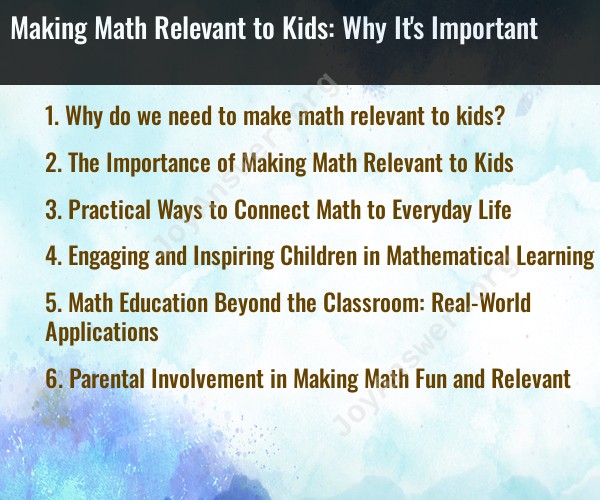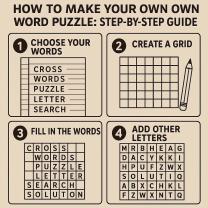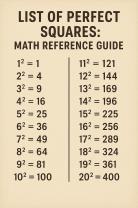Why do we need to make math relevant to kids?
Making math relevant to kids is essential for several reasons, as it helps them engage with and understand this fundamental subject more effectively:
Real-World Application: When math is made relevant, kids can see how it applies to their daily lives. This not only makes learning math more interesting but also helps them understand its practical use in various situations.
Motivation to Learn: Kids are more likely to be motivated to learn when they can see the real-world significance of what they're studying. When they understand that math can help them solve problems, make decisions, and achieve goals, they become more engaged in the learning process.
Critical Thinking Skills: Math involves critical thinking and problem-solving. When kids see the relevance of math in solving real-world problems, they are encouraged to think critically, analyze situations, and make informed decisions.
Preparation for the Future: Math is a foundational skill for many careers and life situations. Making math relevant to kids helps prepare them for future academic and professional challenges, as well as financial and everyday life decisions.
Increased Confidence: When kids understand math's relevance and can apply it in practical situations, they gain confidence in their math abilities. This increased self-assurance can positively impact their overall attitude towards learning and problem-solving.
Enhanced Engagement: Relevance in math lessons can lead to increased engagement and active participation in class. Kids are more likely to ask questions, participate in discussions, and collaborate with peers when they see the connection between math concepts and real life.
Better Retention: Learning math with real-world examples and applications often leads to better retention of the concepts. Kids are more likely to remember and understand math when they can associate it with familiar and practical situations.
Fostering Curiosity: Making math relevant can stimulate kids' curiosity and a desire to explore math further. It encourages them to ask questions, seek answers, and explore mathematical concepts on their own.
Problem Solving Skills: Math teaches problem-solving skills, and when kids see the relevance of math, they are more likely to use those skills to tackle real-life challenges and overcome obstacles.
Global Competitiveness: In an increasingly globalized world, mathematical skills are critical for competitiveness. Making math relevant to kids ensures they are better prepared to meet the demands of a rapidly evolving job market.
Equity in Education: Ensuring that math is made relevant for all children can help bridge educational gaps and promote equity. When math is presented in a way that relates to students' lives, it can benefit a more diverse range of learners.
In summary, making math relevant to kids is crucial for their academic success, personal growth, and future opportunities. It helps them appreciate the practical and real-world applications of math, leading to increased engagement, motivation, and a deeper understanding of mathematical concepts.
The Importance of Making Math Relevant to Kids
Making math relevant to kids is important for a number of reasons. First, it helps them to see the real-world applications of math. When kids can see how math is used in everyday life, they are more likely to be interested in learning it.
Second, making math relevant to kids helps them to develop critical thinking skills. When kids are able to apply math to solve real-world problems, they are developing their ability to think logically and solve problems independently.
Third, making math relevant to kids helps them to develop a positive attitude towards math. When kids see that math is fun and useful, they are more likely to be motivated to learn it.
Practical Ways to Connect Math to Everyday Life
There are a number of practical ways to connect math to everyday life. Here are a few examples:
- When you are cooking, have your kids help you measure ingredients and double or triple recipes.
- When you are going shopping, have your kids help you compare prices and calculate discounts.
- When you are traveling, have your kids help you read maps and calculate distances.
- When you are playing games, have your kids help you keep score and calculate probabilities.
- When you are doing household chores, have your kids help you measure and cut materials and calculate angles.
Engaging and Inspiring Children in Mathematical Learning
There are a number of ways to engage and inspire children in mathematical learning. Here are a few tips:
- Make math fun and playful. Use games, puzzles, and other activities to make learning math enjoyable.
- Be positive and encouraging. Praise your child's efforts and celebrate their successes.
- Provide opportunities for hands-on learning. Children learn best by doing. Give your child plenty of opportunities to experiment and explore mathematical concepts.
- Make math relevant to your child's interests. Find ways to connect math to your child's hobbies and everyday life.
- Be a role model. Show your child that you enjoy math and that you value it as an important skill.
Math Education Beyond the Classroom: Real-World Applications
Math education should not be limited to the classroom. There are many opportunities for children to learn and apply math outside of the classroom. Here are a few examples:
- Museums and science centers often have interactive exhibits that allow children to learn about math concepts in a fun and engaging way.
- Libraries offer a variety of books and resources on math for children of all ages.
- Many community organizations offer math clubs and other programs for children.
- Parents can also provide opportunities for their children to learn and apply math outside of the classroom. For example, parents can take their children to the park to play math games or help them with math problems at home.
Parental Involvement in Making Math Fun and Relevant
Parents can play a vital role in making math fun and relevant for their children. Here are a few tips:
- Talk to your child about math. Ask them about what they are learning in school and help them to connect those concepts to their everyday life.
- Play math games with your child. There are many fun and educational math games available online and in stores.
- Encourage your child to read books and articles about math.
- Visit museums and science centers with your child. Many of these exhibits have interactive elements that allow children to learn about math in a fun and engaging way.
- Help your child with their math homework. Be patient and supportive, and let them know that it is okay to make mistakes.
By following these tips, parents can help their children to develop a positive attitude towards math and to see its relevance in their everyday lives.













